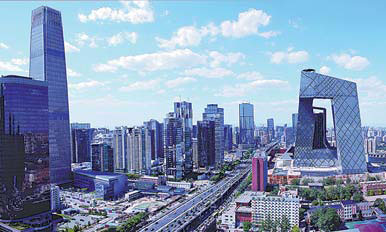Chaoyang district brims with benefits
Beijing's Chaoyang district, the city's central business district and home to many diplomatic missions, is committed to conducting more cooperation in finance, corporate business, technology and people-to-people exchanges with the Macao Special administrative region and Portuguese-speaking countries to fuel robust growth.
Situated in eastern Beijing, Chaoyang is the largest urban district in the capital. With fast modernization and internationalization, its finance sector, modern services, cultural innovation and high-end manufacturing have long been pillar industries.
Wang Zhimian, deputy chief of Chaoyang district, said that as China is promoting the Belt and Road Initiative, global and domestic companies alike in Chaoyang are keen to build more business connections with Portuguese-speaking countries such as Brazil, Angola, Mozambique and Guinea-Bissau, through establishing closer business ties with Macao.
China's Belt and Road Initiative, proposed in 2013, is a trade and infrastructure network comprising a Silk Road Economic Belt and a 21st Century Maritime Silk Road. The planned network connects Asia, Europe and Africa and passes through more than 60 countries and regions.
"The 20th Macao International Trade and Investment Fair aims to take advantage of the blend of Macao's unique Eastern and Western cultures to effectively play the role of a regional business platform. Exhibitors across the globe can showcase their products, services and technology, deepen mutual understanding and promote exchanges," Wang said.
Chaoyang is in charge of the Beijing exhibition at the fair promoting the business environment of the Chinese capital.
Based on Macao's industrial structure and market demand, as well as that of other Portuguese-speaking nations, Chaoyang selected high-end manufacturing, cultural innovation, tourism and education as the main themes to help Macao and others learn more about Beijing's industrial structure, development potential and fast-growing sectors.
Wang said global and local companies in Chaoyang have mature experience and a good record for carrying out financial, corporate business and infrastructure projects in overseas markets, and the district's government will continue to encourage them to conduct more cooperative activities in Macao and Portuguese-speaking markets.
Chaoyang's gross domestic product was 433.73 billion yuan ($68.3 million) in 2014, up 7.6 percent year-on-year. In the meantime, the district generated 41.6 billion yuan in revenues, a 9.6 percent increase from 2013.
"As Beijing is promoting the modern service industry and is undergoing an industrial upgrading boom to develop high-end products, companies from Macao and Portuguese-speaking countries will surely have their chance to participate in the city's energy, modern services and equipment development projects, in a long-term perspective," Wang said.
Eager to enhance its earning ability, Chaoyang has continued to improve the business environment with better management of governmental funds, as well as the service sector. It has attracted 107 multinationals to set up their China or Asia-Pacific regional headquarters in different areas throughout the district.
It is home to the Asia-Pacific headquarters for global aluminum producer Alcoa Inc, Sony Mobile Communications Inc and the world's biggest oil producer, Saudi Aramco Oil Co. It is also the North Asia headquarters for ABB Group, Doosan Heavy Industries and Construction Co and Toyota Tsusho Corp.
To date, companies that are on the Fortune 500 list have invested in 306 projects in Chaoyang. These mainly involve bulk energy, commodity trading, mobile communications, e-commerce, automobiles and high-end equipment manufacturing.
In addition, Chaoyang has gathered more than 80 percent of Beijing's international organizations and foreign business chambers.
The district's use of foreign capital reached $3.9 billion in 2014, a year-on-year increase of 14 percent, accounting for 43.1 percent of Beijing's total.
Li Ping, a researcher of regional economic development at the Beijing-based Chinese Academy of International Trade and Economic Cooperation, said Chaoyang has already strengthened coordination with commercial authorities at all levels, ranging from the Ministry of Commerce to the district's industry and commerce departments, sharing information on policy and services to compete with other established rivals in the city, such as Haidian and Dongcheng districts.
Chaoyang has also simplified its administrative approval procedures and uses an online application system in its governmental branches to improve efficiency.
The district created a brochure listing 18 policies to attract foreign investors, hoping to enhance local support.
zhongnan@chinadaily.com.cn

|
The CBD area of Chaoyang district is home to many Asia-Pacific regional headquarters of multinational companies. |
(China Daily 10/23/2015 page12)



















